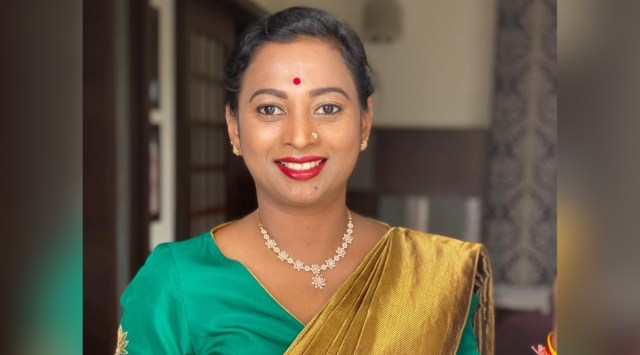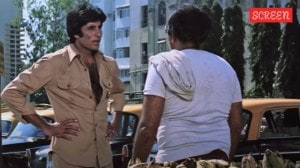Trolled by BJP, Congress Karnataka MLA says: ‘I have a professional side and private, nothing is hidden… Why create a persona that’s not achievable?’
MLA from Karnataka's Mudigere (SC) seat, second-generation politician, and former corporate lawyer, entrepreneur, Nayana Jyothi Jhawar says not for "blanket view" on cases of caste atrocities
 Nayana Jyothi Jhawar is the Congress MLA from the Mudigere (SC reserved) Assembly seat in Chikmagalur district. (Facebook/Nayana Jyothi Jhawar)
Nayana Jyothi Jhawar is the Congress MLA from the Mudigere (SC reserved) Assembly seat in Chikmagalur district. (Facebook/Nayana Jyothi Jhawar) Among the large crop of 70 first-time MLAs in the newly-elected Karnataka Legislative Assembly is Nayana Jyothi Jhawar, 43, the Congress MLA from the Mudigere (SC reserved) Assembly seat in Chikmagalur district. A second-generation politician, Nayana Jyothi Jhawar, who has been a corporate lawyer and an entrepreneur, is following in the footsteps of her mother Motamma, 72, who was elected as the first Dalit woman MLA in Karnataka from Mudigere in 1978, and subsequently in 1989 and 1999, on Congress ticket.
Jhawar is one of five Dalit women MLAs in the Karnataka Assembly. There are a total nine women MLAs in the current House.
Unlike preconceived notions of an Indian woman politician, Jhawar runs a designer clothing enterprise and was previously a corporate lawyer and banker — following degrees from the National Law School of India in Bengaluru and the University of Pennsylvania. Recently, she was targeted on social media for her choice of attire and attitude in her life outside the political sphere. Jhawar speaks about her vision as a first-time MLA representing a reserved constituency, and differences in the challenges she faces compared to her mother. Excerpts:
Your mother was in politics for over four decades. You were a lawyer and entrepreneur. What brought you into politics?
Jhawar: I have always wanted to be in politics. One of the reasons is the environment I grew up in at home. The second reason is the understanding and realisation that this was the channel through which I could affect lives the most. I also realised that this could involve job satisfaction — if you can call it that. I felt I wanted to change and affect lives in a powerful manner. I saw that politics had a bearing on education, infrastructure, everything. A politician can touch many lives.
Your mother entered politics at a different time and era. How do you see the struggles she had to undergo, compared to your own struggles to make a mark in Karnataka politics?
Jhawar: The environment is extremely different. She started in 1978 as the first Dalit woman MLA, a first-generation politician in the family. She came from an extremely poor background and went into politics after education. Her struggle was to gain confidence as a person and a human being — to be able to enter public life while coming from a really humble background. This was her struggle. Politics happens under the public gaze and you need a personality where you are very confident and sure of yourself. I am sure she grew up with her own set of complexes, given her background.
As a second-generation politician, I have had different challenges. The first thing that comes to people’s minds when they think of second-generation politicians is nepotism. They do not consider that one may have come to politics out of their own volition. They discount you and make you believe that you have no talent. This has been one of my biggest challenges. Another challenge was that I was looking after a rural seat, while having an extremely modern outlook. I did not come from a humble background like my parents. I was more comfortable but faced the challenge that people would not take me seriously. I worked in Bombay for eight years, then went to a very premier law school in India, and then the US. My mindset and outlook are very different from those of my parents.
I am not a very conservative or traditional politician. I bring my own set of ideas, my own mannerisms. There is a saying that it is much more difficult to find one’s feet in politics if you are the daughter of a mother who was in politics, than if you are the daughter of a father who was in politics, or the son of a politician (male or female). I was aspiring to represent a rural set-up, and given my professional background and thinking, it was initially difficult. My mother got immediate recognition when she entered politics, but I have had to make my way into politics.
How long did you work in the Mudigere Assembly segment before you won it this time?
Jhawar: I entered politics in 2014. I became active in 2015. I worked for my mother in the 2018 elections. I always wanted to join electoral politics. I have been focusing on this constituency for the past five years, ever since my mother lost in 2018. There has to be space for you to work. Between 2015 and 2018, I worked in the Congress organisation — with the Mahila Congress and the Congress SC wing — for a couple of years. Once D K Shivakumar became the KPCC president in 2020, he eased me into the constituency and gave me a goal — to grow and be in a position to contest the elections.
What are the challenges you are up against, now that you have been elected? It is a reserved constituency that the BJP has held twice since 2004.
Jhawar: One of the biggest challenges in a reserved constituency is to maintain the caste balance. It becomes a very human issue, because you are representing one of the most backward communities. There is a mindset in society — you want someone who is very docile — a pushover whom they can easily get to say yes to everything. The reserved constituencies invariably see the exercise of some sort of invisible control, because of the caste dynamics. They want to have that control, making this one of the biggest challenges.
The second is that there is a perception that reserved constituencies do not want someone who is educated or exposed to the world, someone who knows their way around. These are the biggest challenges. For me, going forward, the challenge is to retain support (of the people). This seat has been a BJP stronghold since 2004, especially with the Datta Peetha controversy from the 1990s, over a disputed shrine shared by Hindus and Muslims. Now that we have broken their hold, we hope to cater to everyone — all castes. It is a misconception that other castes do not matter. To ensure around 40,000-45,000 votes, we have to involve all castes, take them along.
The constituency has faced huge development problems over the past 20 years, which means I have to bridge the gap for what has not been done — in five years. People have a lot of expectations from me and they are very hopeful after electing a new face. They have accepted me, despite the rural setting and my modern outlook. This means they have set a lot of hopes on me. So I have to deliver. This is one of the biggest challenges before me. The other challenge is to navigate the bureaucracy and get all essential work done.
Infrastructure is a big issue. We have land issues due to the presence of forests nearby. I have my own set of goals and dreams, such as an upgraded, high-tech hospital, coaching centres for competitive exams and centres for skill development. I am quite ambitious about my plans for the constituency, and have to work around to get these done. At present, people have to go to Mangalore 121 km away, to access a good hospital.
With Western Ghat forests contiguous to parts of Mudigere, there are issues of land usage and man-animal conflict. How significant are these?
Jhawar: The two big issues with the forest department are providing land for agricultural purposes, and for housing. There is so much area demarcated as reserved or deemed forests that there isn’t enough land for housing. In the last 20 years, there hasn’t been any land allotted for housing. Meanwhile, 50% of our population work as a labour force on the estates, with a fair number of them living on the estates. MLAs from Chikmagalur district spoke with the forest minister and the revenue minister yesterday (June 19) to do a joint survey before coming to a conclusion.
We also spoke about the instances of man-animal conflicts, which have grown significantly in the last few years. I grew up here as a child. In the past, their numbers were insignificant. The government has spoken about introducing something like railway fencing. We also need a system where elephants can find food in the forests itself. They keep coming out into habitations because they don’t find enough food in the forest areas. These are things that have to be addressed, systematically and gradually. Right now, the elephant task force is working full-time because there have been deaths in the last few years. In the last year itself, we had three deaths. We need to resolve this issue.
The Congress received overwhelming support from women in these polls, possibly because of the guarantees targeted at women. Are you under additional pressure to deliver on these promises?
Jhawar: I can confidently say many of the women voters supported me. There will be a lot of expectations for these women-oriented schemes to be implemented well, and this is not restricted to my constituency, but across Karnataka. Also, there are few women MLAs in Karnataka, so women all over will want to connect directly with us to have their issues addressed.
Chikamagaluru is among the districts with a high number of cases of atrocities against SC/STs. Will you be addressing this as well?
Jhawar: I don’t hold a blanket point of view on these things. If they have voted for someone like me, the society has to be somewhat progressive. There are people who are aware and conscious among all the communities. So these issues will have to be dealt with case by case.
A BJP stronghold, Chikamagaluru is often bracketed with Dakshina Kannada as being communally polarised and conservative. Is that a challenge?
Jhawar: We broke the BJP’s hold over the region after 20 years, winning five out of five seats in Chikmagalur, probably for the first time since 1985. If you look at Dakshina Kannada, we won only one of the eight seats, while we did not win any seat in Udupi. So obviously, the people of Chikamagaluru are thinking differently. The coastal region does not have that much of an influence here.
Your margin of victory was narrow, only 722 votes. Did this cause anxiety during the counting?
Jhawar: When I was trailing from a couple of places, I was anxious. But after the eighth round of counting, I was confident of victory. The margin was a bit disappointing, as I expected it to be much higher. But I’m going to work on those areas where we did not do well. The takeaway is that in 2018, my mother lost by 12,500 votes, and I have managed to erase that lead, which is a huge dent on the BJP votes, despite higher polling this time.
You were recently trolled by the BJP on social media for your outlook and for what you do in your private life.
Jhawar: I lead a very open life. Even if you are a public persona, there is no need to hide your private life. When you hide aspects of your life, it leads to controversy. When you present yourself the way you are, there is less chance of controversy. I have a professional side and a private side, and nothing is hidden from the public. From my point of view, this is the correct approach.
In your private space, you can enjoy life like any other normal person. You can wear clothes like others and enjoy family or social life like a normal human being. Why create a persona that’s not achievable, or fake?











